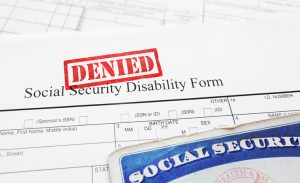Can I appeal a denied claim for Social Security Disability benefits?
More than 60 percent of first-time applications for Social Security Disability (SSD) are denied each year, according to data from the Social Security Administration (SSA). Many of these claims are for qualifying medical conditions, but they are often rejected due to mistakes made during the filing process.
If your initial application for SSD benefits was denied, know that you’re not alone and that your hope for benefits is not lost. Tennessee disability lawyer Michael Hartup has extensive experience helping SSD applicants successfully appeal their claims and recover the benefits they need.
To learn if The Law Offices of Michael Hartup can help you, please call our Jackson, Tennessee, office at 731-424-5559 or contact us online.
Why are SSD Claims Denied?

In order to receive Social Security Disability benefits, you must not only prove that you have a qualifying impairment, but you must also meet certain employment qualifications and filing restrictions.
The SSA has a detailed process for filing, reviewing, and accepting or rejecting applications for SSD benefits. It’s important that applicants follow the process precisely. Many first-time claims are denied due to simple errors like incomplete applications or inadequate medical documentation.
Following are other issues that may result in denial for SSD or Supplemental Security Income (SSI) benefits.
‘Substantial Gainful Activity’/Too Much Income
SSD benefits are only awarded to those who cannot engage in “substantial gainful activity.” A person who earns more than a certain net amount of impairment-related work expenses is considered capable of substantial gainful activity; the amount of monthly earnings that qualifies as substantial gainful activity is set by the SSA and depends on the nature of the disability.
SSI is a disability benefit intended for low-income individuals, and it also has limits regarding substantial gainful activity. However, SSI also has overall income restrictions that affect your eligibility to receive benefits.
Insufficient Work Credits
A U.S. citizen’s access to Social Security benefits, including SSD benefits, is based in part on his or her work credits.
Depending on your age, you need to have worked for at least half of a given time period prior to the onset of your disability in order to be eligible for SSD. Note that if you qualify as low-income and you haven’t achieved sufficient work credits for SSD, you may still be eligible for Supplemental Security Income.
Disability is Short-Term
To qualify for SSD benefits, your impairment must be expected to last at least 12 months or result in death. The SSA does not consider temporary conditions that will heal as “disabling,” even if they result in short-term dysfunction.
Disability is Based on Drug Addiction
If you suffer from the abuse of alcohol or other drugs and that is the primary reason for your inability to work, you will not be eligible for SSD benefits. You may still be able to receive benefits for conditions in which alcohol or drug use were contributing factors, but the drug use itself cannot be the primary contributing factor to the disability.
Prior SSD Denials
Some people who have their first application for SSD benefits rejected think it’s better to re-apply than to go through the appeals process. But the SSA routinely denies claims when they see that previous applications from the same individual were rejected and not subsequently appealed. This is why it’s important to follow the SSD appeals process.
Appealing a Denied Social Security Disability Claim

If your initial application for SSD benefits was denied, you have 60 days to make an appeal. There are four levels of appeal:
- Reconsideration: This is a new review of your application by a new case processor that will take into account your original application as well as new evidence to support your claim.
- Administrative law judge hearing: If the reconsideration ruling also results in a denial, you can request a hearing before an administrative law judge. This stage also provides an opportunity to present new evidence, clarify information or offer expert testimony.
- Social Security Appeals Council review: If the administrative law judge hearing results in another denial, you can take your claim before the Social Security Appeals Council. The Council can either look at your case anew, send it back to the administrative law judge for further review, or deny your appeal.
- Federal court review: If the Appeals Council decides not to review your file or to reject your claim, a final appeal made be made in federal court. This stage requires the filing of a civil lawsuit.
Although you are not required to work with an attorney to apply for SSD benefits or appeal denied SSD claims, doing so can improve your chances for a successful and timely outcome. Applicants for SSD and SSI benefits are twice as likely to be approved for benefits when they do so through a disability lawyer, according to a survey by the legal publisher Nolo; the success rate was even higher during the appeals process.
Contact a Dedicated Disability Attorney
Attorney Michael Hartup is dedicated to helping disabled individuals from Tennessee and Kentucky get the benefits to which they’re entitled.
He understands the challenges faced by SSD applicants, and his practice is devoted entirely to guiding people through disability applications and appeals. Mr. Hartup can represent you through every step of the disability benefits process, including making your case before the Appeals Council or in federal court.
To arrange your personal consultation, please call our Jackson, Tennessee, office at 731-424-5559 or contact us online.
